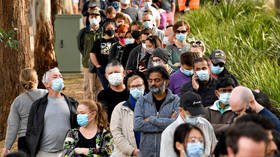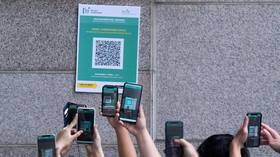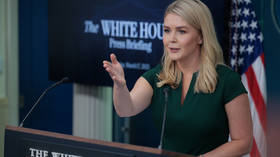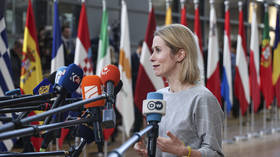Shocking new report shows how disabled children and families like mine became the forgotten victims of the pandemic
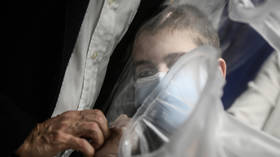
A staggering 84% of parents like me with disabled children have developed some form of anxiety disorder since Covid struck due to support services being cut. A new report, Then There Was Silence, highlights the need for action.
For the parents of newborns, it’s a key moment when they can finally dispense with the baby monitor that buzzes away next to their ear, as they struggle for some shut-eye while still listening for signs of unrest from their sleeping tot.
Imagine what it must be like if that time never arrives. Because, for parents like me of disabled children with respiratory issues, lying awake at night listening to the sneezes, coughs and splutters coming from their bedroom is an insurmountable barrier to a decent night’s sleep. And I’ve now had almost 20 years of it.
Also on rt.com Covid jab figures prove the EU is anything but united, with poorer countries left lagging dangerously behindAudio or video monitors don’t help. They just sit there accusingly on a bedside table, occasionally beeping or flashing while, even asleep, you are on high alert anyway. The moment something sounds not quite right, you’re out of bed like Usain Bolt out of the blocks to check that everything’s okay.
It can be exhausting. Recently, we had a night where my 19-year-old daughter Elvi began snuffling away in the wee hours. It turned into coughing, then choking and, as I dashed downstairs to help her, she vomited all over her bed and me. While I cleaned her up and finally got her back to sleep, that was the end of my night’s rest. It was still only 2:30am.
This is not just my story. I know dozens of parents of children with disabilities who face the same challenges and who, like me, just get on with it. After all, many of these children and young people have support around them which we have all begun to rely on. Maybe a bit too much, it seems.
There are well-staffed residential colleges and schools, such as Elvi has, respite places, sleeping time, care workers and, of course, the various audio and visual monitors, pressure mats that emit an alarm and, in some cases, hospitals. Or, at least, there were.
Because the pandemic pretty-much wiped out all this. Residential colleges and schools shut their doors and students were sent home to… to what? Local authorities, who play a huge role in social care and education, had no Plan B for such an eventuality and it was left to parents – who themselves suddenly found their working week revolved around the spare bedroom – now had to add full-time care and special education needs to their daily timetables.
No wonder, as a shocking new report entitled ‘Then There Was Silence’ from the Disabled Children’s Partnership (DCP) shows, 84% of parents of children with disabilities developed some sort of anxiety disorder during the pandemic.
But what’s even more disturbing, even upsetting, is that 71% of parents say their child’s progress has reversed or regressed during the pandemic. This is a crisis.
The easing of lockdown measures doesn’t seem to have made much difference either, as the study found nine of out ten disabled children were socially isolated, and 76% of those have seen no improvement over the course of this year, despite restrictions lifting.
In our case, while most schools have now fully returned across the UK, our Elvi’s new placement was delayed by six weeks, as staffing and support needed more time to organise under a new regime. So, after the end of the six-week summer break, we have another six weeks in which to organise care and activities while trying to earn a living.
But you don’t hear anyone talk about it. Maybe this report from DCP, a coalition of 90 disability and children’s charities, will prompt more discussion. Not only does it shine a light on an area of society that, understandably, many people never give a moment’s thought to, but it is a hollering, angry, cry for help from parents and professionals in the field of disability.
Parents of disabled children are used to standing by and waiting their turn. Boarding public transport, standing at the checkout, waiting to cross the road, negotiating red tape to access services... we take our time doing simple tasks as the world rushes past us.
Also on rt.com British schools in chaos as THOUSANDS of Covid-free kids are sent home to self-isolate, as summer catch-ups roll outThat doesn’t mean we’re taking a back seat. And, as with those politicians who dared show up at the launch of ‘Then There Was Silence,’ that doesn’t mean we are not prepared to speak up.
Now is the time, however, when our voices should be heard. With the crippling withdrawal of formal and informal support having a devastating effect on our lives, and that impact still being felt 18 months later, it’s time for action.
We might be an inconvenience, we might be a less-important priority at the time of a national health crisis and we might be an issue for the ‘too-hard’ basket, but we will not be silent. Not any more.
If you like this story, share it with a friend!
The statements, views and opinions expressed in this column are solely those of the author and do not necessarily represent those of RT.

